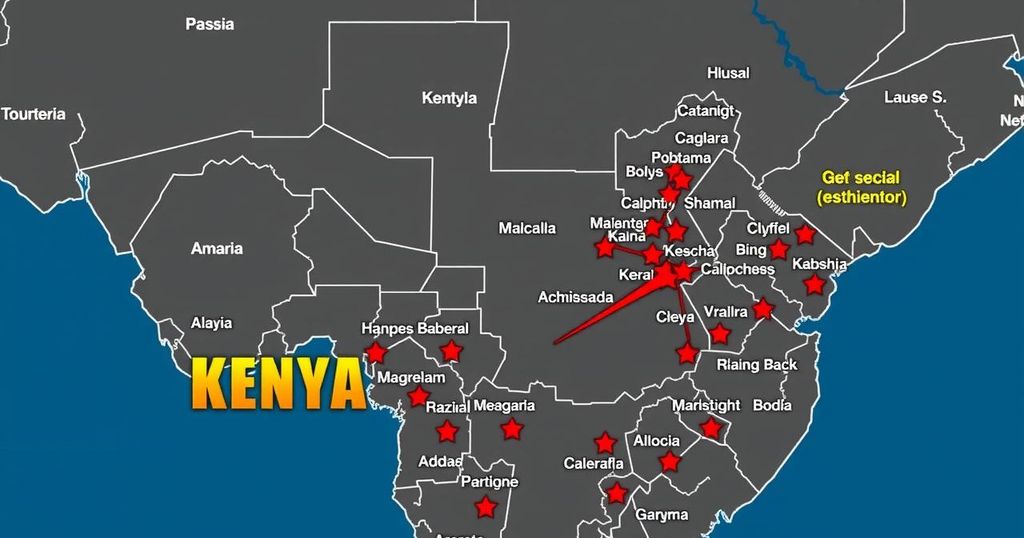Business
economics
ADANI, ADANI AIRPORT HOLDINGS LIMITED, ADANI ENERGY SOLUTIONS LIMITED, ADANI GROUP, ADANIMUSTGO, AFRICA, ECONOMY, GA, GAUTAM ADANI, JOMO KENYATTA INTERNATIONAL AIRPORT, KENYA, NAIROBI, OP, OPIYO WANDAYI, POLICE BRUTALITY, PRIZES, STOPADAN, STOPADANIDEAL, TAX HIKES, US, WANDAYI, WILLIAM RUTO, WORLD NEWS
Jamal Walker
0 Comments
Kenya Cancels Adani Contracts Amid U.S. Bribery Indictments, Sparking Public Outcry
Kenya’s cancellation of multi-billion dollar deals with Adani Group followed U.S. bribery indictments of Gautam Adani, igniting massive social media reactions. Hashtags such as #StopAdani trended as citizens expressed outrage over the contracts. Allegations of non-competitive awarding of these deals further fueled public protests, emphasizing the demand for accountability in governmental contracts.
The recent cancellation of multi-billion dollar deals with Adani Group by the Kenyan government has sparked significant uproar on social media. Following the indictment of Gautam Adani and six others by U.S. prosecutors on bribery charges, hashtags such as StopAdani and ArrestAdani gained traction on the platform X in Kenya. This discontent arose despite initial statements from Kenyan officials, including the Energy Secretary, indicating that the agreements would progress, which was quickly countered by public outcry and viral campaign efforts, comprising over two million posts. The Adani Group’s contracts were focused on major infrastructure projects, valued at approximately USD 2.5 billion for enhancements in energy and the operation of Nairobi’s Jomo Kenyatta International Airport.
Amidst these events, allegations surfaced suggesting that these contracts were secured without a transparent bidding process, further fuelling public dissent. Since the whistleblower’s claims earlier this year, protests have emerged, leading to demands for the cancellation of the deals and inquiries into additional contracts involving Adani with Kenya’s health ministry. Despite the government’s retractions of the multibillion-dollar contracts, the conversation surrounding Adani remains active on social media platforms, underscoring growing public concern over corporate governance and accountability in state procurements.
The backdrop for this uproar stems from the indictment of Gautam Adani by U.S. authorities on bribery charges, raising serious questions regarding the transparency of his business dealings. Adani Group had entered into extensive contracts with the Kenyan government, particularly in the energy and infrastructure sectors, valued at around USD 2.5 billion. The indictment prompted immediate reactions from citizens, who have been monitoring the ethical implications of such large-scale contracts, particularly given the allegations of unfair bidding practices that emerged from a whistleblower’s account. This situation has intensified scrutiny on governmental processes and corporate conduct, leading to increased activism from the Kenyan populace, who are now demanding accountability.
In conclusion, the cancellation of Adani Group’s contracts by the Kenyan government reflects the rising public consciousness regarding corporate ethics and government accountability in procurement processes. The swift mobilization on social media reveals a significant societal response to perceived corruption, particularly in light of allegations surrounding the legitimacy of these contracts. As the situation evolves, it sets a precedent for public engagement in governmental dealings and emphasizes the critical need for transparency and integrity within both private enterprises and governmental agencies.
Original Source: www.indiatoday.in




Post Comment